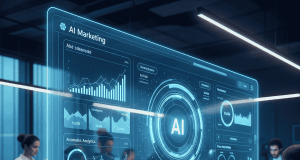In today’s rapidly evolving digital landscape, artificial intelligence (AI) is redefining how businesses approach marketing and political campaigns. Harnessing the power of AI is no longer a luxury; it’s a necessity for those looking to maximize their impact. This article explores how AI is transforming campaign strategies, driving engagement, and enhancing decision-making for businesses and political entities alike.
Understanding AI in Campaign Strategies
AI refers to the simulation of human intelligence in machines programmed to think and learn like humans. In campaign strategies, AI tools analyze enormous amounts of data to generate insights, automate processes, and predict outcomes. This shift from traditional tactics to data-driven strategies is influencing how campaigns are conceived and executed.
Data-Driven Decision Making
One of the most significant advantages of AI is its ability to analyze vast datasets quickly. Campaign teams can leverage machine learning algorithms to identify patterns and trends in audience behavior, enabling them to:
Segment Audiences: By analyzing demographics, interests, and online behaviors, AI can help marketers tailor messages to specific audience segments, ensuring that communications are relevant and personalized.
Predict Outcomes: AI models can predict the likely success of various campaign elements, from ad placements to messaging strategies. This foresight allows for proactive adjustments and optimizations.
- A/B Testing: Rapid testing of different approaches yields real-time insights into what resonates best with audiences, making it easier to refine strategies before full-scale implementation.
Enhanced Personalization
In a world where consumers are inundated with messages, personalization is key. AI technologies can analyze past interactions and preferences to deliver highly relevant content, significantly enhancing user engagement. For example, recommendation algorithms that suggest products based on previous behavior can increase conversion rates. In political campaigns, targeted ads can be crafted to resonate with specific voter concerns, ensuring that messages hit home.
Automating Campaign Processes
AI-powered tools can automate many time-consuming aspects of campaign management, such as:
Content Creation: Natural Language Processing (NLP) algorithms can generate written content, from social media posts to full-length articles, enabling teams to focus on strategy rather than logistics.
Social Media Management: AI can schedule posts, engage with audiences, and analyze social media sentiment, providing insights into how content is received and identifying areas for improvement.
- Lead Scoring: AI can assess potential leads based on their likelihood to convert, enabling teams to prioritize efforts on high-potential prospects.
Real-Time Analytics and Adjustments
The ability to monitor campaign performance in real-time is a game changer. AI-driven analytics platforms provide live insights into how campaigns are performing, allowing teams to make data-informed adjustments on the fly. Whether tweaking ad spend or altering messaging on the go, this agility is essential in today’s fast-paced environment.
Ethical Considerations
While the rise of AI brings remarkable opportunities, it also raises ethical questions concerning privacy and algorithmic bias. Juggling the need for personalization with the imperative to respect user privacy requires meticulous adherence to ethical standards and transparency in AI applications. Campaigns must prioritize ethical considerations to maintain public trust and avoid backlash.
The Future of AI in Campaign Strategies
As AI technology continues to advance, its integration into campaign strategies will deepen. Future innovations may include:
Predictive Analytics: Enhanced AI capabilities will offer more accurate predictions of consumer behavior and electoral outcomes, guiding more strategic decision-making.
Augmented Reality (AR) and Virtual Reality (VR): Combining AI with AR and VR could create immersive experiences in campaigns, allowing for deeper engagement and emotional connections.
- Improved Collaboration Tools: AI can facilitate better collaboration among team members by automating mundane tasks, enabling more time for creative and strategic thinking.
Conclusion
The rise of AI is undeniably transforming campaign strategies, making them more effective, efficient, and personalized. From data-driven decision-making to real-time analytics, AI empowers businesses and political entities to engage their audiences like never before. As these technologies continue to evolve, those who embrace AI will find themselves better equipped to navigate the complexities of modern campaigns, ultimately driving maximum impact in a competitive landscape.
Harnessing the power of AI isn’t just about keeping pace with the competition; it’s about leading the charge into the future of marketing and advocacy.









